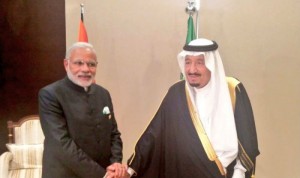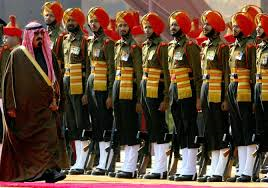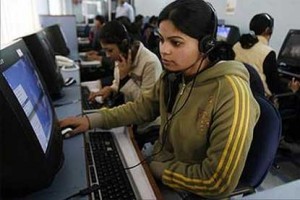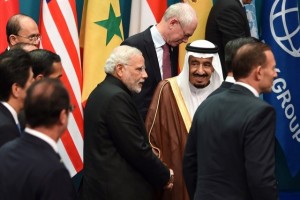
RIYADH: Spiritual home of Islam and the energy powerhouse in the Gulf region, Saudi Arabia has rolled out the red carpet to welcome India’s Prime Minister Narendra Modi on his first visit to the country that will cohere New Delhi’s ‘Think West’ policy and Riyadh’s Act East policy to spawn a new strategic vision for this crucial partnership.
Flags of India and Saudi Arabia, home to nearly 3-million strong Indian diaspora, flutter in the balmy desert breeze as one heads from King Khalid Airport to the majestic King Saud Guest Palace, where the Saudi monarch is hosting the Indian leader and his delegation. Mr Modi will be touching down in Riyadh on April 2 after engaging the EU leadership in Brussels and world leaders at the Nuclear Security Summit in Washington. The two-day visit to Saudi Arabia, the first trip by an Indian prime minister to the world’s largest producer of oil after a gap of six years, is expected to pitch the India-Saudi strategic, economic and energy ties onto a higher trajectory. The focus will on buttressing four key pillars of India-Saudi relationship: energy, business, security and diaspora.
Strategic Vision
 The overarching priority will be to upgrade the strategic and security content of the multi-faceted partnership, with a special focus on enhancing counter-terror cooperation, which has acquired a new salience in view of the proliferation of terror monsters like the Islamic State and the festering crisis in Syria. Building on his successful visit to UAE in August 2015, PM Modi will be signaling enhanced importance to the region through his visit to Riyadh.
The overarching priority will be to upgrade the strategic and security content of the multi-faceted partnership, with a special focus on enhancing counter-terror cooperation, which has acquired a new salience in view of the proliferation of terror monsters like the Islamic State and the festering crisis in Syria. Building on his successful visit to UAE in August 2015, PM Modi will be signaling enhanced importance to the region through his visit to Riyadh.
The India-Saudi relationship has been viewed primarily through the prism of energy security, but with the shifting geopolitical dynamics in the region, bolstering strategic partnership and security cooperation has acquired a new urgency. Against this backdrop, Mr Modi is expected to unveil a new narrative of Think West policy during his visit to Riyadh, which will invest India’s multifarious relations with the Gulf region, home to 7 million-strong Indian diaspora, with the larger strategic vision. In days to come, one can expect India’s Link West policy to come on a part with Act East policy, addressing a deficit of strategic thinking towards the region.
India’s Think West orientation coincides with Saudi Arabia’s Look East policy as Riyadh proactively scouts for new oil markets in view of the slowdown in Europe and the shale revolution in the US. Mr Modi, building upon the 2006 Delhi Declaration and the 2010 Riyadh Declaration, will enunciate an all-encompassing vision of India’s plans to transform relations with the energy-rich region.
Counter-terror Cooperation
The upgraded strategic relationship between India and Saudi Arabia is translating into enhanced counter-terror cooperation. On this front, the signals from Riyadh in the past few years have been encouraging, which has been seen in India as a supporter of Pakistan. “A new aspect of our relationship has emerged in the last six-seven years which is a very intense and is marked by close security cooperation between our security agencies,” says Mridul Kumar, joint secretary in charge of the Gulf region in India’s Ministry of External Affairs. The 26/11 Mumbai terror attacks in November 2008 proved to be a turning point, leading to initial exploratory attempts to develop functional counter-terror cooperation between India and Saudi Arabia. The first breakthrough occurred in June 2012 when Saudi Arabia deported Zabiuddin Ansari (Abu Jundal), a terrorist suspected of involvement in the Mumbai carnage. This was hailed as a major advance by India as this was the first time Riyadh, despite pressure from Islamabad, extradited a wanted terrorist with a Pakistani passport, and signalled Riyadh’s intention to diversify its network of relationships in South Asia, beyond its traditional ally Pakistan. Since then, many suspected terrorists have been deported to India by Saudi Arabia for their links to terror activities or terror financing.
PM Modi will be, therefore, looking to push a pact on enhanced counter-terror cooperation, which will involve closer cooperation in countering terror financing, especially to check the flow of funds from Saudi Arabia and Gulf to local radical outfits based in India. The enhanced counter-terror cooperation will also involve intelligence-sharing and closer consultations between security officials of the two countries.
In this context, India will also be vigorously seeking the support of Kingdom of Saudi Arabia for Comprehensive Convention on International Terrorism (CCIT). If Riyadh pledges support, it will be a major breakthrough for India as CCIT is bogged down in quibbles over definitions of terrorism, with OIC countries ranged against it.
The rise of the Islamic State, which has targeted Saudi Arabia and has also India on its radar screen, is also going to propel coordinated regional and international efforts to combat terrorism and to develop a strategy to eliminate the sources of terrorism and extremism including its funding, as well as combating organized cross-border crime. In view of intensified radicalization drive by the Islamic State, India will be looking to firm up cyber security cooperation with Saudi Arabia. The proactive cooperation from Saudi authorities will be crucial in defeating online propaganda of the IS.
India will also share its concerns with the top Saudi leadership over Pakistan’s continuing support for anti-India terror and thriving sanctuaries of terror operative in the AfPak region. PM Modi will be looking to persuade Saudi leadership to use its leverage over Pakistan to crack down on anti-India terror outfits.
Defence and Maritime Cooperation
Enhancing military-to-military cooperation and maritime security cooperation will be high on PM Modi’s Riyadh agenda. Ever since the two countries signed a defence cooperation pact in February 2014 during the visit of Saudi Defense Minister (now King) Salman, defence has been identified as an important pillar of the 2.0 version of India-Saudi ties. The growing accent on military cooperation was reflected in the decision by Saudi Arabia to host an Indian Air Force (IAF) flying contingent, which included 100 senor senior IAF officers and state-of-the-art defence platform systems, including Sukhoi MKI fighter aircraft, at the King Fahd Air Base in Taif in August 2015. The recent developments point towards concrete plans to expand military-to-military cooperation, which will be reflected during PM Modi’s visit. The important outcomes in the military field are expected to include plans for joint air and naval exercise, besides greater cooperation in training of Saudi defence personnel in India. Enhancing defence cooperation with Saudi Arabia is a strategic necessity for India given the presence of nearly 3 million Indians in the Gulf region and 7 million Indians in the West Asia region. PM Modi has personally conveyed thanks to the Saudi king for facilitating the evacuation of Indians from the Gulf region.
Maritime cooperation will be another focus area. Building on goodwill visits by the Indian Navy ships to the ports of Jeddah and Jubail, plans for joint naval exercises are expected to be unveiled during PM Modi’s visit.
Upgrading Economic Ties
The Modi government has identified the cash-rich Gulf region as a prime source of funds for its ambitious plans for transform India’s s infrastructure sector. In this context, PM Modi will be actively rooting for enhanced investments from West Asia’s largest economy and top oil supplier, Saudi Arabia. Saudi investments in India have been negligible, which are currently less than $1 billion. The near-term aim should be to get at least $4-5 billion investments from Saudi Arabia in the near term, in the next 2-3 years. This is not a difficult target despite Saudi Arabia losing around $100 billion in the last 15 months due a dramatic fall in oil prices. The new situation is also creating new synergies and opportunities as Saudi Arabia experiments with new projects to present itself as a gateway to the region and Africa. In view of low oil prices, India should be, however, realistic about aiming too high for Saudi investments, R. Dayakar, a former ambassador of India to Iraq, told India Writes Network.
Currently, bilateral trade between India and KSA is around $40 billion, which is largely made up of Saudi oil imports, but there is clearly potential for more diversified trade basket. India has been importing phosphoric acid from Saudi Arabia for some time, and will be looking to step up imports of this crucial resource for making fertilizers, said Mr Dayakar. By way of background, Saudi Arabia is the fifth largest market in the world for Indian exports. India is the fifth largest market for Saudi Arabia’s exports.
Strategic Energy Partnership
In view of the fluid energy market and oil prices hitting to a new low, India and Saudi Arabia are looking to transform the buyer-seller relationship into a strategic energy partnership, focusing on investment in oil refineries and joint ventures across the hydrocarbon value chain. Saudi Arabia is the largest supplier of crude oil to India, and this fact is unlikely to change in the near future, officials said. Taking a long-range view of energy security, India will be focusing on partnering with Saudi Arabia to create strategic oil reserves.
Caring for Diaspora
 Saudi Arabia is home to around 3 million-strong Indian community, the largest Indian diaspora in a single country in the region, which sends in around $10 billion in annual remittances. With complaints of labour exploitation coming on and off from Saudi Arabia, India is pushing for a labour agreement with Saudi Arabia that will include non-domestic workers.
Saudi Arabia is home to around 3 million-strong Indian community, the largest Indian diaspora in a single country in the region, which sends in around $10 billion in annual remittances. With complaints of labour exploitation coming on and off from Saudi Arabia, India is pushing for a labour agreement with Saudi Arabia that will include non-domestic workers.
The Road Ahead
Against the backdrop of the intricate geopolitical puzzle in the Middle East, Prime Minister Modi will be doing a delicate diplomatic balancing waltz as two of its key partners in the region are on opposing sides on the Syria crisis, with the relations plumbing to a new low between Riyadh and Tehran. India has supported a broad-based reconciliation process in Syria, and is opposed to regime change in Syria, which has not played down well in Saudi Arabia, but as PM Modi’s visit to Riyadh shows, KSA is not letting the Syria issue cloud relations with New Delhi. Saudi Arabia respects India’s principled position on Syria underlines that building a multi-faceted strategic and economic partnership with India is more important than differences on issues such as Syria, Ishrat Aziz, a former ambassador of India to Saudi Arabia, told India Writes Network.
 Taking a long-range view, Prime Minister Modi’s maiden visit to Riyadh looks set to transform India’s multifarious relationship with a changing Saudi Arabia, and imbue it with an overarching strategic vision that will open new pathways for mutual empowerment on multiple levels. There are some issues of dissonance, but the leaders of the two countries are determined not to let these come in the way of forging the emerging 2.0 vision of this crucial partnership.
Taking a long-range view, Prime Minister Modi’s maiden visit to Riyadh looks set to transform India’s multifarious relationship with a changing Saudi Arabia, and imbue it with an overarching strategic vision that will open new pathways for mutual empowerment on multiple levels. There are some issues of dissonance, but the leaders of the two countries are determined not to let these come in the way of forging the emerging 2.0 vision of this crucial partnership.
(Manish Chand is Editor-in-Chief of India Writes Network, www.indiawrites.org, an e-magazine-journal focused on international affairs, and CEO of TGII Media Private Limited)
Author Profile

- Manish Chand is Founder and Editor-in-Chief of India Writes Network (www.indiawrites.org) and India and World, a pioneering magazine focused on international affairs. He is CEO, Centre for Global India Insights, an India-based think tank focused on global affairs.
Latest entries
 India and the WorldFebruary 17, 2026South-by-South: Focus on people-centric solutions at India AI summit
India and the WorldFebruary 17, 2026South-by-South: Focus on people-centric solutions at India AI summit India and the WorldFebruary 7, 2026Modi hails interim India-US trade deal, Goyal says no concessions made on agriculture
India and the WorldFebruary 7, 2026Modi hails interim India-US trade deal, Goyal says no concessions made on agriculture India and the WorldFebruary 2, 2026Trump announces trade deal with India, Modi ‘delighted’
India and the WorldFebruary 2, 2026Trump announces trade deal with India, Modi ‘delighted’ India and the WorldJanuary 31, 2026Palestinian minister bats for mediatory role for India in ending Gaza conflict
India and the WorldJanuary 31, 2026Palestinian minister bats for mediatory role for India in ending Gaza conflict







